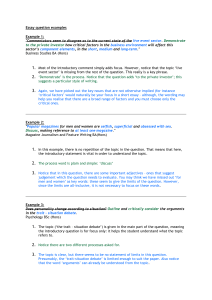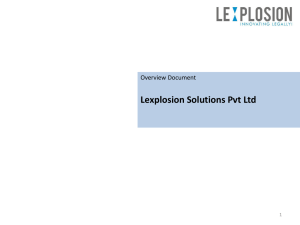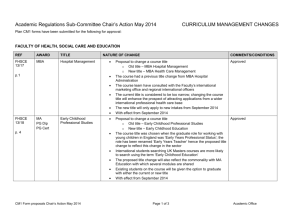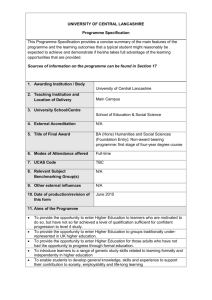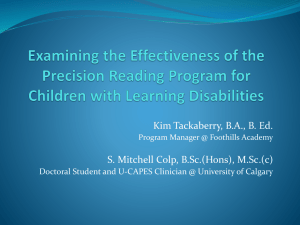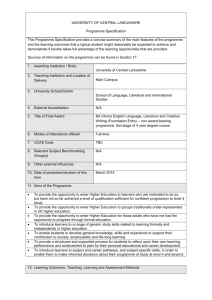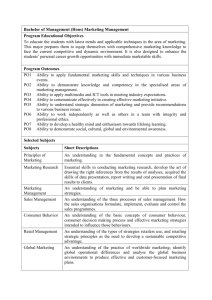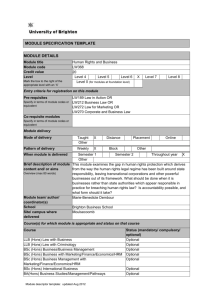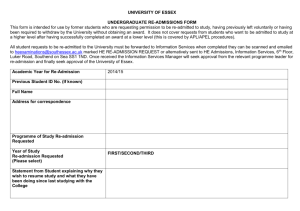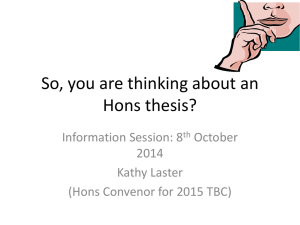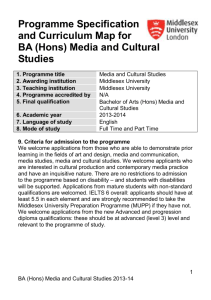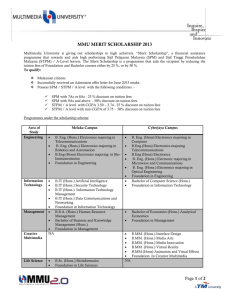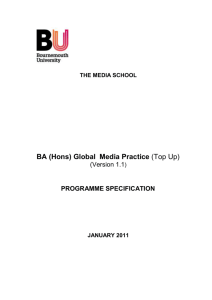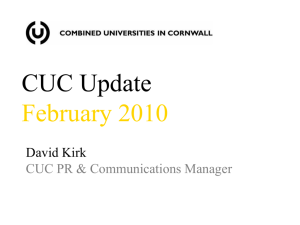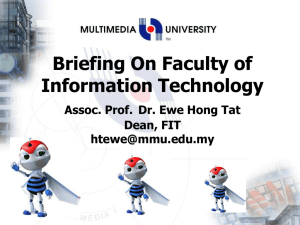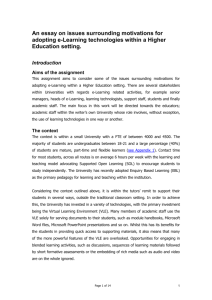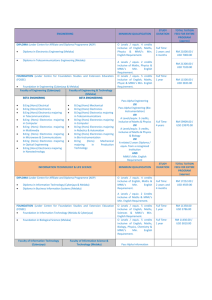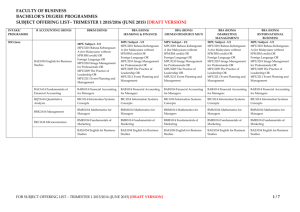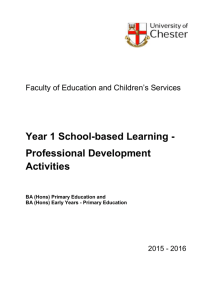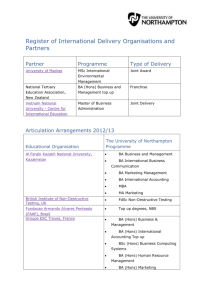course specification. - University of Central Lancashire
advertisement
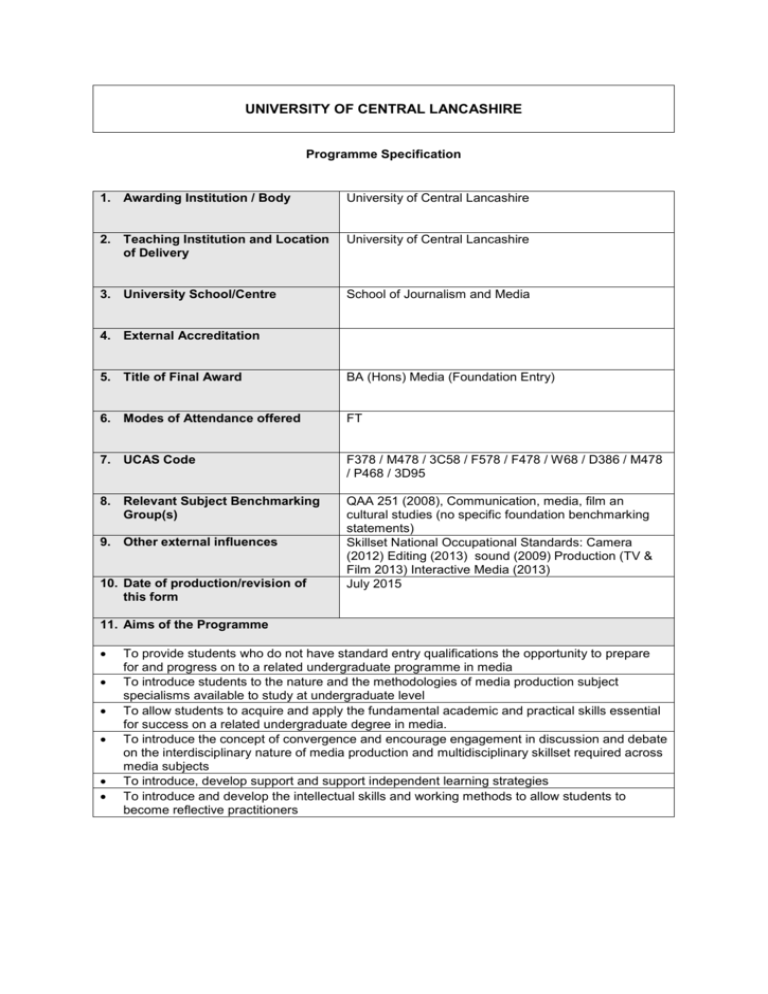
UNIVERSITY OF CENTRAL LANCASHIRE Programme Specification 1. Awarding Institution / Body University of Central Lancashire 2. Teaching Institution and Location of Delivery University of Central Lancashire 3. University School/Centre School of Journalism and Media 4. External Accreditation 5. Title of Final Award BA (Hons) Media (Foundation Entry) 6. Modes of Attendance offered FT 7. UCAS Code F378 / M478 / 3C58 / F578 / F478 / W68 / D386 / M478 / P468 / 3D95 8. Relevant Subject Benchmarking Group(s) QAA 251 (2008), Communication, media, film an cultural studies (no specific foundation benchmarking statements) Skillset National Occupational Standards: Camera (2012) Editing (2013) sound (2009) Production (TV & Film 2013) Interactive Media (2013) July 2015 9. Other external influences 10. Date of production/revision of this form 11. Aims of the Programme To provide students who do not have standard entry qualifications the opportunity to prepare for and progress on to a related undergraduate programme in media To introduce students to the nature and the methodologies of media production subject specialisms available to study at undergraduate level To allow students to acquire and apply the fundamental academic and practical skills essential for success on a related undergraduate degree in media. To introduce the concept of convergence and encourage engagement in discussion and debate on the interdisciplinary nature of media production and multidisciplinary skillset required across media subjects To introduce, develop support and support independent learning strategies To introduce and develop the intellectual skills and working methods to allow students to become reflective practitioners 12. Learning Outcomes, Teaching, Learning and Assessment Methods A. Knowledge and Understanding A1. of concepts relating to audio visual communication in media production A2. of concepts relating to linear and none linear (interactive) narrative A3. of media production methods and workflows A4. of approaches and roles in a media production context Teaching and Learning Methods Lectures, seminars and workshops will be used to introduce key topics and ideas. Students will be supported and encouraged to engage in discussion and practical activities to develop the fundamental concepts of each subject area. This will then be further developed through the context of independent study and exercises in preparation for subsequent classes and in the completion of individual assignments. Assessment methods Practical multidisciplinary production portfolios and journals. Poster displays, presentations and computer based tests B. Subject-specific skills B1. The ability to originate and manipulate media assets B2. Control and adjustment of production equipment including video camera, stills camera, audio recorder, computer hardware B3. The origination and development of media suitable for digital platforms B4. Ability to select and deploy appropriate storytelling and communication skills Teaching and Learning Methods Lectures and workshops will be used to introduce basic skills and techniques these will then be explored in subsequent guided sessions. These skills will be further developed through independent experiential learning through practical exercises and study in the completion of assignments and in preparation for classes Assessment methods Production journals and portfolios Generation and manipulation of media artefacts Creation of documentation to support media production Problem solving exercises Individual and group presentations C. Thinking Skills C1. Research and analysis of media artefacts and assets C2. Selection and deployment of effective strategies for production C3. Critical and personal reflection C4. Experiential learning and problem solving Teaching and Learning Methods Lectures, seminars and workshops will be used to introduce, discuss, nurture and develop skills. These skills will then be contextualised and implemented through exercises and further developed through independent study and the completion of assignments. Reflective skills will also be supported through one to one tutorials. Assessment methods Presentations of analyses Research portfolios Assignments requiring the analysis and selection of effective production strategies Problem solving practical test D. Other skills relevant to employability and personal development D1. Self management and autonomous learning D2. Personal development planning D3. Communication and presentation skills D4. Interpersonal skills Teaching and Learning Methods The requirements of meeting deadlines and the necessity for self management throughout the process of learning and assessment in a challenging though supportive environment will provide a context for learners to engage in, foster and develop personal, academic and creative skills. Lectures, seminars and workshops will be used to introduce and discuss the fundamental skills and concepts that will be developed through the context of independent study, practical work and self- reflection. This will be contextualised through workplace and exhibition visits, guest practitioner talks and case studies. One to One tutorials will also be used to further self-reflection and support personal development planning with a focus on progression to level 4 and beyond. Assessment methods Self-reflective personal development journal Presentation on media industry roles and production methods Initiation and completion of extended project in a chosen media subject area 13. Programme Structures* Level 14. Awards and Credits* Module Title Level 3 Module Code PHC001 Approaches to Photography Credit rating 20 Level 3 PVC001 Introduction to Filmmaking 20 Level 3 PVC002 Scriptwriting for Production 20 Level 3 Level 3 FIC001 TEC001 Film and Media Theory Web Fundamentals 20 20 Level 3 TEC002 Extended Media Project 20 Level 3 TEC003 Audio and Video Technologies 20 Level 3 PHC002 20 Level 3 RPC001 Level 3 AGC003 Self-images: Identities, Diaries and Documents Introduction to Animation and Games Sound recording and Design 20 20 BA (Hons) Media (Foundation entry) Requires 120 credits to proceed To: BA (Hons) Film Production (must include PVC001 and TEC002) BA(Hons) Television Production (Must includeTEC002 and either TEC003 or FIC001) BA (Hons) Screenwriting with Film, Television and Radio (must include PVC002 and TEC002) BA (Hons) Photography (must include PHC001 and TEC002) BSc (Hons) Media Production (must include TEC003 and TEC002) BSc (Hons) Web Design and Development (must include TEC001 and TEC002) BA (Hons) Animation (must include RPC001 and TEC002) BA (Hons) Games Design (must include RPC001 and TEC002) Exit Award Certificate of Achievement 15. Personal Development Planning The course has at the heart of its design the encouragement of students to put personal development at the core of their learning. Through group activities, tutorials and assessments learners will be constantly encouraged to reflect on their progress and to apply all of their learning and experiences to their individual academic and career goals. The course is designed to equip students with the skills, knowledge and experience to independently set personal academic and career goals and to make subsequent subject progression choices accordingly. 16. Admissions criteria Programme Specifications include minimum entry requirements, including academic qualifications, together with appropriate experience and skills required for entry to study. These criteria may be expressed as a range rather than a specific grade. Amendments to entry requirements may have been made after these documents were published and you should consult the University’s website for the most up to date information. Students will be informed of their personal minimum entry criteria in their offer letter. This programme is aimed at students with none standard HE entry qualifications. Entry requirements at A2 level would be in the range of DDE and for BTEC MPP equivalent to a UCAS points level of 160 International applications will require an IELTS score of 6.5 Mature students and applicants with none standard entry qualifications will also be considered, particularly if they have professional or other relevant experience 17. Key Sources of information about the programme University, School and course specific web sites QAA guide – http://www.qaa.ac.uk/Publications/InformationAndGuidance/Documents/CMF08.pdf Skillset – http://www.skillset.org/standards/standards/Camera/ http://www.skillset.org/standards/standards/IM/ http://www.skillset.org/standards/standards/Editing/ http://www.skillset.org/standards/standards/Production/ 18. Curriculum Skills Map Please tick in the relevant boxes where individual Programme Learning Outcomes are being assessed Programme Learning Outcomes Core (C), Compulsory Module (COMP) or Knowledge and Subject-specific Level Code Module Title Option (O) understanding Skills Thinking Skills A1 PHC001 PVC001 PVC002 TEC001 TEC002 TEC003 Approaches to Photography Introduction to Filmmaking Scriptwriting for Production Web Fundamentals Extended Project Audio & Video Technologies LEVEL 3 Self-Images: Identities, PHC002 Diaries and Documents FIC001 Film and Media Theory (O) (O) (O) (O) COMP (O) (O) (O) Introduction to Animation and RPC001 Games AGC003 Sound Recording and Design (O) x x x B2 x x x x x x A2 A3 B1 x x x x x x x x x x x x x x x A4 x x x x x x B3 x x B4 x x x x x x C1 C2 x x x x x x x x x x x x x x x x D2 x x x x x x x x x x x x x x x x x D4 x x x x D3 x x x x x D1 x x x C4 x x x x x C3 Other skills relevant to employability and personal development x x x x Note: Mapping to other external frameworks, e.g. professional/statutory bodies, will be included within Student Course Handbooks

